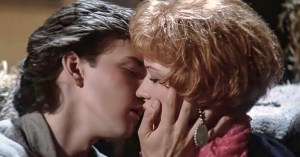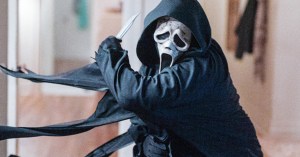Star Trek: Discovery Showrunners and Star Talk About That Shocking ‘Despite Yourself’ Death
Series returns from its midseason break serving up a dramatic death. Co-showrunners Gretchen J. Berg and Aaron Harberts and the actor playing the character who is violently killed talk about the episode.
Co-showrunners and executive producers Gretchen J. Berg and Aaron Harberts also spoke to us about the pivotal death in “Despite Yourself,” Jonathan Frakes’ contribution to the series, and what a Tarantino Star Trek might look like.
Debbie Day for Rotten Tomatoes: You must be gearing up for such a big episode.
Aaron Harberts: Well —
RT: The public reaction, I mean.
Harberts: It’s crazy, yeah. It’s so funny. We have to be so far out in front of — because of visual effects and lead times and all of that stuff, we’ve put this one to bed for a while, and then taking the break, Gretchen and I literally had to — we’re already working on season 2, we’re working on episode 2 of season 2 — so we literally had to be like, “What’s airing? Let’s go back to this episode.”
Gretchen J. Berg: As you watch, you’re like, “Oh yeah, there’s a lot going on.”
RT: So that death, what do you think the response is gonna be?
Harberts: Let me put it this way: every time Gretchen and I watch that death, that moment of horrible violence, we blanch.
Berg: Yeah, it’s shocking and heartbreaking.
Harberts: It is meant to be. It is meant to hit the audience right between the eyes, and we are — how do we tee this up? People have asked us if we knew that this was going to happen, and if we knew we were going to do this. Why would we do this knowing full well about the Bury Your Gays trope and the backlash and frenzy that comes with that? We see what happens to Dr. Culber as the first chapter of what is going to be an epic love story, and a love story that’s going to transcend death. We believe in the story, and we believe in giving this really important story, and this really important story about heroism and love, to our gay couple, and to these brilliant out actors, Anthony Rapp and Wilson Cruz.
I’m an out gay man, and from where we sat, it’s like, if we need to get on the phone with every media outlet, if we’ve got to go online and make sure that people understand that this is a beginning, not an ending, then that’s what we’re gonna do, because what’s coming for this couple, and what’s gonna be coming for these two gay characters, and for not only our gay audience, but for the entire audience, is a story that we don’t get to see a lot in science fiction, where the gay couple are the heroes. The gay couple and their love saves the universe, and why take that away from the gay characters to give it to the straight characters, just because we’re afraid of what might happen after one episode.
We all joined hands, Wilson and Anthony as well, and we believe in the story, and we’re excited to tell it, and the beauty of Star Trek and science fiction is truly this isn’t the end for this couple, and the audience needs to know how important it is for us to represent our gay community, the gay community, and be iconic characters, and you don’t cast Wilson Cruz and Anthony Rapp in Star Trek just to get rid of them.
We’re gonna scream it from the mountain tops. We don’t want to spoil things for the audience, because part of the fun of this version of Star Trek is to be on the edge of your seat, waiting for what’s next. But there’s a reason for everything that we do, and we take nothing lightly, and some incredible storytelling and some incredible performances and some incredible opportunities for these characters to enter the pantheon of vital and important gay characters, is gonna happen.

RT: When I was watching the scene, it was just heartbreaking — period. It’s a character that you love, and then that happens. I guess, in that way, it’s very successful, because I wasn’t thinking about what their position is in the canon of Star Trek — although of course it’s important — I was just present, responding emotionally.
Berg: Thank you for saying that, Debbie, and I agree with you too, because I think that — I don’t want to sound naïve, but there was something in just, as a straight woman, my investment in that couple, and not really ever thinking of them as “the gay couple,” but as — we’ve never said officially that they’re married, but they’re like our married couple on the show, and I’ve always been interested in the dynamics just strictly, because everybody’s coming from a different point of view, right? I was impressed by this couple because they were able to exist on a ship, so there are — how many? — several hundred lives, and that’s it, and be this twosome, but also this onesome, and not make their twosome be something bigger than their onesome.
I have always just thought couple dynamics, or individual dynamics, are interesting, so everybody brings something different to it. And I think what we all can agree on is that Wilson and Culber represent something that you love, and also with Stamets, so it is as people have known this story and this episode intimately, from the beginning, from the earliest outlines and beat sheets, even now, like Aaron said before, when we see it happen, it hits you. It’s a stomach punch. That is a testament to the performances and the actors, and it hits you, it’s an emotional whammo.
Harberts: I think the other thing that’s interesting about it, too, is that, straight or gay, the tragedy in this is that Culber was the smartest person in the room; that’s always the tragedy, when the character who knows the most or wants to help the most or is almost ready to crack open something very important, is silenced. I think that’s also where it hits you, because you’re just realizing, “Wow, he wasn’t killed because of anything other than being literally the most insightful person and really good at his job.” We’ll see. Let’s watch how it progresses, but I know that people are gonna be pretty stunned when it happens.
RT: I was just talking to Wilson Cruz about the moment that’s surrounding the actual death, and we were talking about, for me even as it was happening, it brought me a little bit into reality, because it was like, “Oh my gosh, that’s what psychologists and psychiatrists who have to deal with seriously mentally disturbed people have to face.” And you don’t realize how treacherous some jobs like that might be.
Berg: The way that I thought Wilson did it, too, he was so calm and caring, but also very — I felt like the boundaries were there, too, like you’re saying. He’s like, “No, we’re gonna do what I’m saying,” but he’s not freaking out. It does take you to that place of how quickly things can change, and you’re right, they also are heroes, people who are dealing with folks who need help, but are dangerous to themselves. He did a great job.
RT: It’s a beautiful moment — and terrible. Really, really awful.
Harberts: We get it.
RT: I was talking to Jonathan Frakes, which, let’s start there: Jonathan Frakes as director.
Berg: Yay! Great place to start.
RT: How did he get brought in to direct this episode?
Harberts: We worked with Jonathan on Roswell, so back when we were young, young, young writers on staff, he was one of the —
Berg: We’re talking the ’90s.
Harberts: He was an executive producer on Roswell.
Berg: Our producing director worked with him as well. He is a no brainer for Star Trek, because he’s so fantastic as a director and he brings everything that is Star Trek to it, but he’s also a fantastic director of actors and storytelling. I feel like that fight sequence in that turbo lift is one of the most awesome things I’ve ever seen.

Harberts: We get along with him so well, and this season of Star Trek we were so shot out of a cannon, so it was really all about having a comfort level with directors, and needing to know that the people who were coming up to shoot them were phenomenal in every way.
And Jonathan we knew to be not only an amazing director, but super collaborative, and also, more than anything else, relentlessly positive. Episode 10 came at a time in the run of our show when everybody, at this point everyone’s exhausted — and I’m talking about me and Gretchen too — everyone’s near tears, everyone is like, “Oh my god, can this be over?” So you need that injection of optimism and joie de vivre, and just incredible — he injected the spirit of camaraderie in there, and he was just what the doctor ordered. He would have been great for any episode, but this was perfect in terms of the timing, and I’ll tell you, he not only turned in a phenomenal episode, and one of the best director’s cuts Gretchen and I have ever seen, but when he left, the cast was walking on air, the crew was just doing back flips, and he leaves a set better than he found it, and he’s awesome.
Then the other thing that you get, the cast in particular gets, is someone else who knows exactly what they’re going through or what they will be going through. It’s always awesome when an actor directs, because the actors instantly feel like, “Hey, it’s one of us, and he knows how to talk to us, or she knows how to talk to us.” But then Jonathan’s able to talk to them as few others can, which is from the perspective of being an iconic actor, cast member of this franchise, and I think that they all really gleaned a lot of incredible advice and perspective from him too, and that’s something that no one else can give them.
RT: You handed your cast a gift, is what you’re saying?
Harberts: We handed ourselves a gift, and our cast a gift. Yeah, he is a gift. He’s the best. We love him.
Berg: I love him. He’s the best.
Harberts: He will be back in season 2.
RT: That was my next question.
Harberts: We don’t know which episode yet, but he is —
Berg: We’re chasing him down now.

RT: I recalled from this episode that the Discovery found itself where it was due to a “temporal anomaly,” and Jonathan Frakes corrected me and said it was a “quantum anomaly,” and I was thinking, “I thought I knew this kind of thing.” For the unfamiliar, what is the difference?
Harberts: That’s funny, because I think we do say —
Berg: I thought we said “temporal.”
Harberts: I think we do say “temporal anomaly.”
Berg: We might have to call Jonathan and ask.
Harberts: We might have to clarify with Jonathan.
Berg: He’s probably been through more than we have.
Harberts: Whatever Jonathan says is right.
Berg: I was gonna say, he’s probably right.
Harberts: I think what we were doing — be it quantum or temporal — was to simply honor what we know from [1967 Star Trek episode] “Mirror, Mirror,” which is to say that in a moment where you cross over from the prime universe to the mirror universe, that there is an equal swap. So when Discovery crossed over into the mirror universe, mirror Discovery crossed over into the prime universe, and that actually is going to figure into some of the storytelling and some of the things that happen towards the end of the season. Quantum, temporal, we’re gonna have to figure that out.

RT: When I was watching the episode, it did occur to me, when they explained that the other ship would have swapped over to their universe, I thought, “Man, sh–’s gonna hit the fan.”
Harberts: Yeah.
Berg: I hope they’ve got a camera running on that ship right now —
Harberts: We talked about it; it’d be such a fun episode to have been able to do, which is watching that ship switch places, and what exactly happened. We do track it, and it does become a plot point, but it would have been a fun standalone.
RT: Yeah, I think so too, the parallel to the parallel universe. That brings up something about the science-speak in this show. Do the writers come with a guide to the Star Trek lexicon?
Berg: The guide itself is in a lot of ways the 700-plus hours of show and movies that came before, but we do have people on our staff who very much speak that language every day.
Harberts: We have, many writers on staff are huge, huge Star Trek fans, and it’s interesting because some are fans of all of the versions, but it’s interesting how most of these fans are gravitating to certain things. For some of our writers, they’re TNG all the way, some are TOS, some are Deep Space Niners, and some are Voyagers. We even have an Enterprise fan.
Gretchen and I have been very open about the fact that we were aware of Star Trek, we had all watched, we had watched versions of TOS and TNG in little bits here and there, but we were not Trekkies; we were not Trekkers coming into this.
We’ve managed to surround ourselves with people who really do know the show, and do know what that bridge-speak and science-speak is like. But in addition to that, we have a researcher, a full time researcher, this incredible guy named Anthony Maranville, whose life’s work is to provide us with research, and he’s got contacts across the scientific community.
Berg: And what’s great about Anthony, too, is he’s a writer in his own right, so he’s able to figure out when he looks over, or is in the room and he hears what we’re talking about, he’s able to bring the things that aren’t just interesting scientific stories or facts or whatever; he’s able to link it to what we’re trying to do, or say, “Hey, I heard you talking about this story. It reminded me of this article I read, or it reminded me of this physicist that I know that I want to get on the phone with you guys.” He has such a great grasp and understanding of what would feed the show, what’s helpful to the show, so he’s phenomenal, and he really keeps a very careful good eye on what we’re doing scientifically.
Harberts: The other ace up our sleeve of course is that we have the real Paul Stamets on speed dial, so he is always available to get on the phone and help us through things and provide us with the right words. We’ve got an incredible support system here, an incredible group of people who are helping us out.

RT: I’ve talked to Jonathan and Wilson about it: What is your take on the Tarantino Star Trek news?
Berg: What did they say?
Harberts: I guess my first thing was: I’m really excited to see some of my favorite actors like Jennifer Jason Leigh and Uma Thurman in Star Trek uniforms, hoping that he pulls together his typical group. I think that I love Quentin Tarantino, and I love Star Trek, and I’m excited to see what he does.
Berg: Yeah, me too. I was certainly like, “Huh?” But I didn’t realize that he was a fan and whatnot, so we’ll see, I’m eager to see.
Harberts: It’s been interesting. I just watched also that recent Black Mirror episode [“USS Callister“] with Jesse Plemons, who I literally was like, “Wow, he just did the best William Shatner Captain Kirk homage ever.” It seems like anytime people are jumping into the Star Trek fray, they’re doing it with a lot of reverence and love, so I’ll buy a ticket.
PREVIOUS: Wilson Cruz







